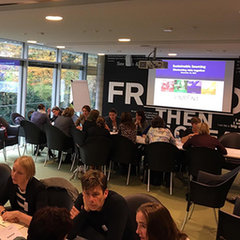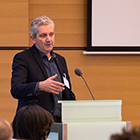Cooperation
Cooperation is essential for attracting worldwide attention to human rights, working conditions, animal welfare, and the environment.
From the start, the Agreement has focused on joint initiatives, collective projects, and sharing knowledge and experience. Cooperation is essential for attracting worldwide attention to human rights, working conditions, animal welfare, and the environment. Supporters also make a contribution here.
Support from the financial sector
In July 2018, a large group of investment companies signed a statement expressing support for the Agreement, the German Partnership, and the Sustainable Apparel Coalition. In the statement, they underline the importance of complying with the OECD guidelines and harmonising national initiatives, with the aim of creating a level playing field for companies that are working to achieve sustainability.
Reporting based on list of production sites
An important joint instrument for dealing with risks is the list of production sites, which now includes 4268 locations. If trade unions, civil-society organisations (NGOs) or other parties become aware of problems at a particular production site, they can alert the companies concerned to the problems through the Secretariat. This happened a few times in 2018. See here an overview of these cases in 2018. In addition, companies sometimes call on stakeholders for help if they notice problems. The Secretariat also regularly contacts signatories in response to media reports.
Living wage and social dialogue
Cooperation requires collective projects in which participants share knowledge and experience, for example regarding the central issues of a living wage and social dialogue. Progress on these issues has a positive effect on all the other issues that play a role in the chain. In 2018, a collective project was started on the subject of the living wage, social dialogue and sustainable purchasing practices. Read more about that project here. Where possible, international cooperation is sought. Training courses have been prepared, which companies are obliged to attend in 2019. The government, NGOs, trade unions, supporters, and international organisations have been involved in the preparations.
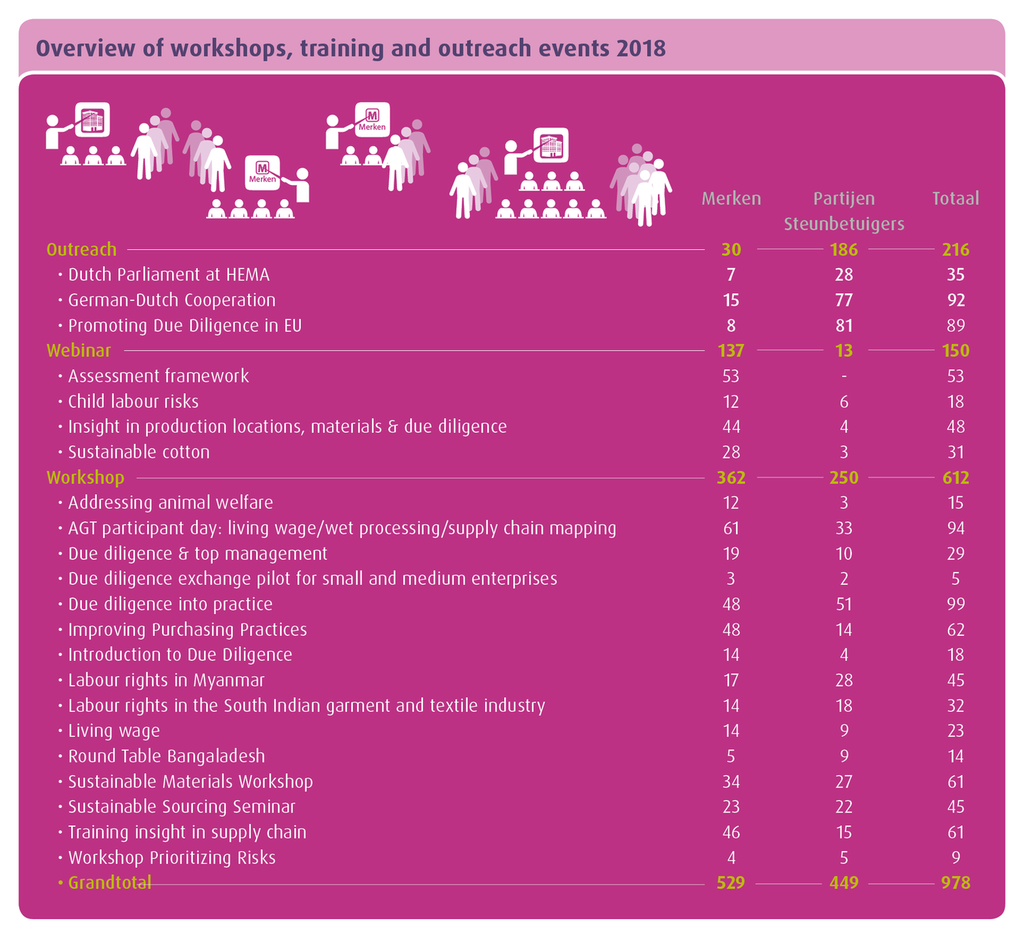
Child labour
The collective project ‘Combating child labour in garment supply chains’, supported by the Fund against Child Labour, has as its aim the prevention of child labour. Read more about the project here. In this context, a number of companies and civil-society organisations had an orientation week in South India and Central Bangladesh in September 2018, to consider together how we can improve the situation in the workplace at factories and spinning mills. The project works together with local NGOs. Among other things, they organise training programmes in spinning mills and factories.
Other activities
Freedom of association and collective bargaining are fundamental human rights. However, in many countries, these rights cannot be taken for granted. For this reason, the trade unions have drawn up a questionnaire that companies can use to discuss these subjects with the management of a factory. A report has been published on the subject of animal welfare. Training sessions and meetings on various topics within the Agreement have also been organised.
Vier Voeters:
‘Aandacht voor dierenwelzijn neemt toe’

Increasing numbers of companies that use textiles that are of animal origin want to improve animal welfare during production. Vier Voeters [Four-legged Friends] helps them with this.
Taking account of animal welfare is a relatively new subject for garment and textile companies.
‘In recent years, it has become increasingly clear that animals also often suffer unnecessarily in the production of fashion,’ says Lonneke Bakker of the animal welfare organisation Vier Voeters. ‘A number of scandals have been in the news worldwide, such as that of angora rabbits in China being plucked alive. This leads consumers increasing frequently to put critical questions to garment companies.’
In 2018, the Agreement published a report on the big five: leather, wool, fur, down and silk. The report gives an overview of where and how these materials are produced and what the risks are. Bakker: ‘We help companies to develop a vision for the use of these materials: what do you find acceptable or unacceptable? The company can then formulate a policy on the issue, for example using non-animal or certified alternatives.’
Matters relating to animal welfare are often so deep in the production chain that it is difficult to get a good grasp of them, according to Bakker. ‘There are certificates or quality marks for some products. This enables you to exclude specific major risks, although not yet for leather, for example. Moreover, production chains are often very complex. It all starts with raising awareness and giving access to knowledge. The Agreement makes this knowledge available. If companies are well-informed, they can make conscious choices and explain these to their customers.’
Trade unions compile questionnaire for buyers
‘Probing questions give a clearer picture’
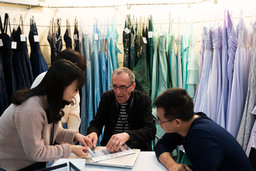
How do you find out what the situation really is regarding trade union freedom and working conditions at the supplier with which you are working? The National Federation of Christian Trade Unions in the Netherlands (CNV) and the Dutch Federation of Trade Unions (FNV) have developed a questionnaire for companies in order to ask probing questions.
Is there trade union freedom at your company?
’ A supplier can answer ‘yes’, but how do you find out whether that is really the case and discover how that freedom to form and join a trade union is really expressed? The CNV and FNV trade union federations noticed that many fashion companies struggle with this question. To address this, they drew up a questionnaire that buyers can use in their talks with suppliers.
‘With this tool, we want to help fashion brands to examine more closely trade union freedom and the social dialogue within a company,’ says Hanneke Smits, regional coordinator for Asia at CNV International. ‘For example, we ask nine supplementary questions on the freedom of trade union association, such as: ‘Does your company inform employees about their rights in relation to the freedom of trade union association?’
The list has a total of some 40 questions on the factory’s policy, the Collective Labour Agreements, and the manner in which the social dialogue is organised. Smits: ‘It remains a complex task to find out how the social dialogue and trade union freedom function in practice, but we nevertheless hope that with this list, companies will obtain a fuller picture of the actual situation in the factory.’
The questionnaire has been on the Agreement’s website since mid-2018. Smits has already received positive responses from various companies. ‘We use the feedback from companies to improve the questions further.’
‘We have more influence on the working conditions and labor rights here in Cambodia, because of the agreements made in the Netherlands with Dutch garment brands. Through our partner organization CNV Internationaal, we can give a signal to Dutch brands if they buy products from a factory that is not complying with the labor law or that work with infeasible piece rates.’Ath Thorn, president of garment federation C.CAWDU from Cambodia
An afternoon of speed dating with Agreement participants
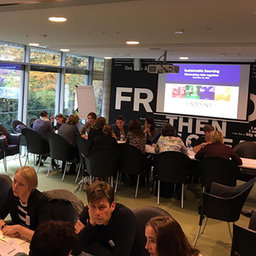
Garment and textile companies are getting better at making contact with NGOs, trade unions, and government in order to take action together for a fairer textile chain. This is partly thanks to the speed dating session arranged by the industry organisation Modint in November 2018.
‘It was a lively event, this speed dating between representatives of textile companies, NGOs, trade unions, and government. People ran short of time and enthusiastically made follow-up appointments.’ Nienke Steen, RBC manager at Modint, looks back with satisfaction on the speed dating event in November 2018. As well as some 30 companies from the Modint constituency, there were also representatives of the government, the FNV and CNV trade union federations, and NGOs such as UNICEF, Solidaridad, Vier Voeters, and Arisa.
‘The Agreement seeks to link companies with organisations that have knowledge in the areas of, for example, working conditions, trade union freedom, and the environment. For a long time, there has been tension in the relationship, because NGOs and trade unions feel companies should do more to improve conditions in specific regions. It has been agreed in the AGT to be constructive in helping one another and to work together in a secure atmosphere. This positive attitude could clearly be seen during the speed dates.’
The trade unions and NGOs set out in brief pitches what their knowledge and contacts could do for companies. Afterwards, the conversations were continued in smaller groups. ‘For participants, this was an accessible and enjoyable way to get to know each other. The intention is for collective projects to be set up, in which companies, trade unions, NGOs, and government cooperate. This meeting provided an impetus to make a start on such projects.’
In addition, the Due Diligence tool was presented during the meeting. The tool shows which NGOs and trade unions are working on which subjects in which region.
Frans Bruin, director of Yongo Europe:
‘Choosing to leave or stay’
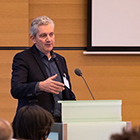
‘In our due diligence process, we discovered that our manufacturer in Indonesia was paying its employees below the minimum wage. The problem is that 10 per cent of the company’s production is for export and 90 per cent for the domestic market. If it were to pay all its staff the minimum wage, it would no longer be competitive in the domestic market and the factory would have to close, putting some 50 employees out of work.
We were faced with a dilemma: should we leave or stay? We discussed the matter with other parties – the Secretariat, the Business Social Compliance Initiative (BSCI) and Solidaridad. Finally, we talked to the CNV. The CNV has contacts with local trade unions and together they will discuss the options with the manufacturer, in order to solve the problem. I hope that we’ll have a good outcome.
We benefited a great deal from seeking cooperation with other parties. I hope that companies that encounter similar problems will do the same: address the problem and work together with others. This is what we signed the Agreement for.’
Interview, Diewertje Heijl:
Companies broaden their view during working visit to South India and Bangladesh
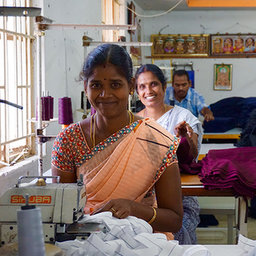
As part of the project to combat child labour in production chains, the participants went on a working visit to India and Bangladesh. Hunkemöller and CoolInvestments went to Bangladesh, together with UNICEF, the Fair Labor Association (FLA) and development aid organisation HIVOS. The visit to India was by O’Neill Europe, Prénatal, WE Fashion and Miss Etam, accompanied by FLA, HIVOS and Arisa – an NGO that protects human rights in South Asia.
‘We wanted to give the representatives of the participating companies a broader view of the textile sector,’ says Diewertje Heijl of Arisa. ‘They talked not only with their own suppliers, but also with government representatives and people from SAVE (Social Awareness and Voluntary Education). This is an NGO that we have worked with in South India for 20 years. A broader, more comprehensive view often makes reality more complex. How do you gain insight into your supplier’s suppliers? And into the risks of child labour and forced labour in the supply chain? How do you enter into discussions with suppliers about child labour? These are complicated questions.’
The visit was the opening shot for the local activities that are part of the project. SAVE is going to train the suppliers of the four companies, both at management and staff level. The training courses deal with the prevention of child labour and forced labour, working conditions, sexual harassment, and health and safety.
Heijl: ‘One supplier will be more open to this than another. We look at what we can achieve with each individual supplier.’ During the working visit, the delegation also met a producer who had already attended SAVE’s training courses. ‘He recounted that a lot has already been achieved in the region with SAVE, but that there is still a lot to do, particularly to improve the position of vulnerable young girls.’
At the same time, in Bangladesh, UNICEF’s local partner CCR CSR has begun to implement UNICEF’s Better Business for Children programme. This is a six-step programme specifically designed to achieve a sustainable increase in positive impacts of companies on the lives of children and to counter negative impacts. Both management and employees from all levels of the organisation will be actively involved. The programme focuses on building knowledge and capacity, and demonstrating the results in order subsequently to upscale this approach in global value chains.
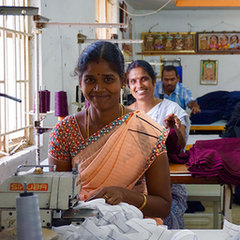
Interview, Diewertje Heijl:
'Companies broaden their view during working visit to South India and Bangladesh'
READ MORE ›


